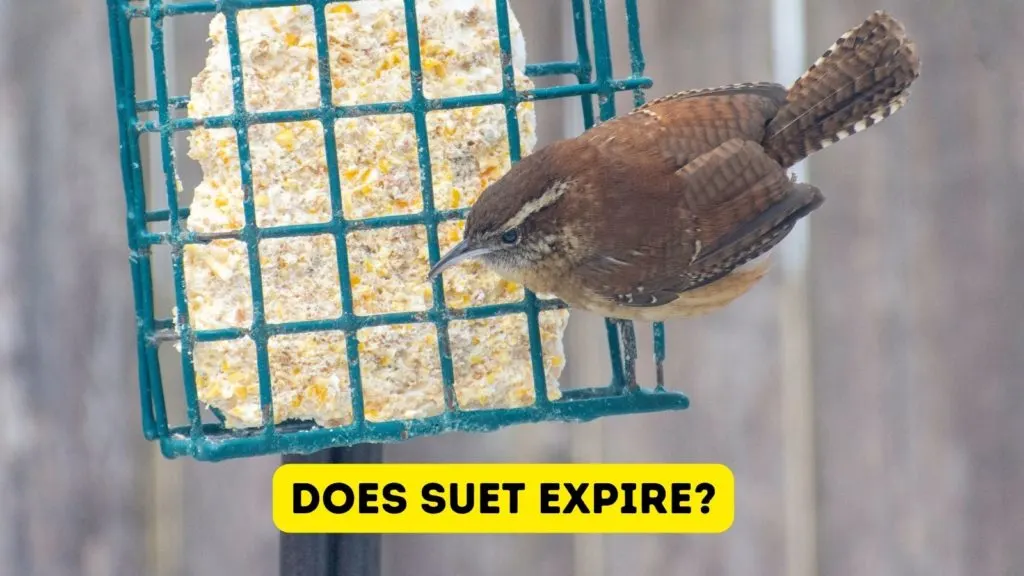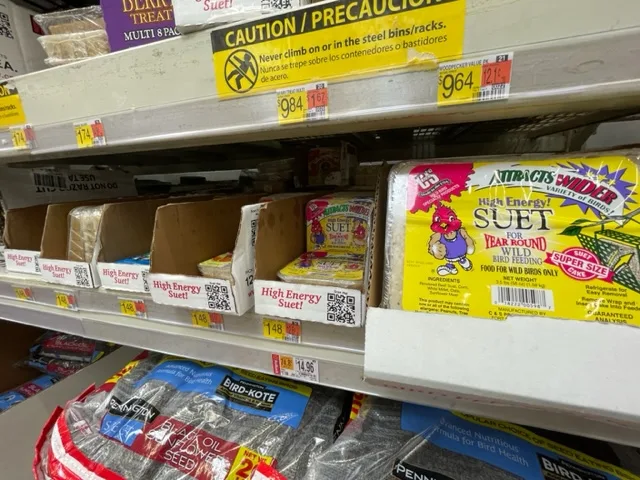Suet, a high-energy food source made from animal fat, is especially popular for feeding birds during the colder months, but it’s also used year-round in many areas. Just like bird seed, suet can go bad, and its quality is crucial for the health and safety of your backyard birds. Knowing how to store suet properly and recognize when it has expired is important for any bird enthusiast.

Can Suet Expire?
Yes, suet does expire. Because it’s made from fat, suet can turn rancid, particularly when exposed to warm temperatures or direct sunlight for extended periods.
Most commercially prepared bird suet comes with an expiration date, which should be your first indicator of its freshness. Just like an expiration date on bird seed, however, suet isn’t stamped with an expiration date but often has a “best by” or “best when used by” date stamped on it.
Typically, suet can last for months if it remains unopened and is stored properly. However, once opened, it’s best used within a few weeks, especially in warmer climates or seasons.
It’s crucial to note that homemade suet, lacking preservatives found in commercial products, may have a shorter shelf life.

The shelf life of suet can vary depending on the ingredients mixed into it, such as seeds, nuts, and dried fruits, which might have their own expiration timelines.
Signs of Bad Suet
There are a few indicators that suet has gone bad:
- Smell: Rancid suet will have an off, sour smell. Fresh suet has a mild, fatty aroma. If it smells rancid, sour, or otherwise unpleasant, it’s likely spoiled.
- Texture: If the suet becomes extremely soft or has a different texture than when it was fresh, it might be going bad. Some softening is expected in warmer weather, but it should not be drastic.
- Mold: Any signs of mold growth indicate that the suet has spoiled and should not be used. That suet needs to go directly to the trash!
- Discoloration: While some changes in color can be due to oxidation and might not indicate spoilage, significant discoloration could be a sign the suet is no longer good.
Storing Suet to Extend Its Life
Freezing suet is an excellent way to extend its shelf life. We always buy about eight suet bricks in a box, using one and popping the others in the freezer.
Suet can be stored in the freezer for several months without losing its quality or nutritional value. Here are some tips for freezing and storing suet:
- Airtight Packaging: Wrap the suet tightly in plastic wrap or place it in airtight containers before freezing to prevent freezer burn and keep it fresh. If you’ve purchased the suet, keep it wrapped.
- Rotation: If you store multiple blocks or cakes of suet in the freezer, use a first-in, first-out system to ensure you’re always using the oldest suet first.
What to Do With Bad Suet
If you discover that your suet has gone bad, it’s important not to offer it to birds, as it could harm their health. Instead, dispose of it in a way that doesn’t pose a risk to wildlife. Do not leave spoiled suet outdoors, as it may attract pests or sick animals. Consider enclosing it in a sealed bag before disposing of it in the trash to prevent any animals from accessing it.
Suet is a valuable food source for birds, providing them with the necessary energy, especially during colder months. However, like any other food, it can expire and become harmful. By understanding how to properly store suet and recognize signs of spoilage, you can ensure that you’re providing safe and nutritious food to your feathered friends!
More Posts You Might Like
How to Prevent Birds from Eating Grass Seed
- 8 Letter Bird Names - August 14, 2024
- 7 Letter Bird Names - August 14, 2024
- 7 Birds Named After Famous People - July 23, 2024
